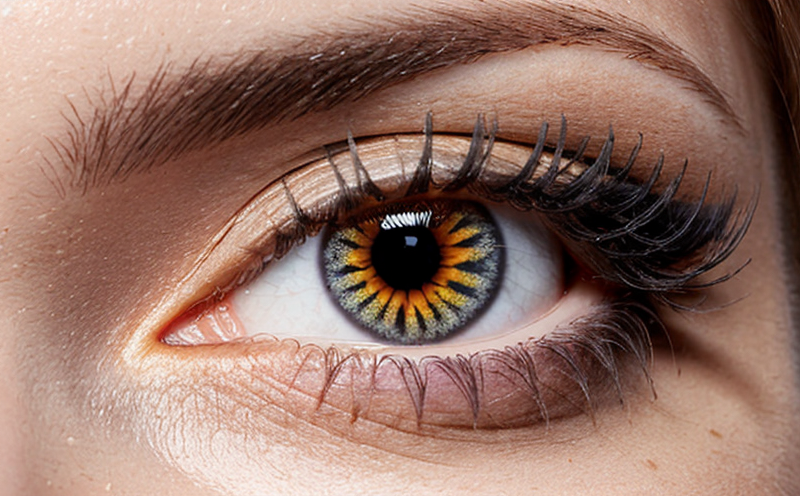Eye Irritation Testing for Waterproof Mascaras
The development and manufacturing of waterproof mascaras present unique challenges due to their formulation. These products often contain high concentrations of preservatives, pigments, and other additives that can potentially irritate the ocular surface if not tested rigorously. Eye irritation testing is a critical step in ensuring consumer safety and compliance with international standards.
The International Organization for Standardization (ISO) defines eye irritation tests as those conducted to evaluate the potential of products or substances to cause inflammation, discomfort, or other adverse effects on the ocular surface when applied. For waterproof mascaras specifically, these tests are essential because of their high viscosity and chemical composition which can exacerbate potential irritants.
Testing typically involves placing a small amount of mascara on the conjunctival sac of rabbits or using alternative in vitro methods as per ISO 10993-11:2015. The test subjects are observed for up to 24 hours post-application, with follow-up observations at subsequent intervals. Acceptance criteria vary but generally include no visible signs of irritation such as redness, swelling, or discharge.
Ensuring that these tests meet stringent standards is crucial not only for regulatory compliance but also for maintaining brand reputation and consumer trust. With the increasing demand for natural and organic products, it's imperative to demonstrate that even waterproof mascaras adhere to high safety standards without compromising on efficacy or performance.
- In Vivo Testing: Utilizing live animals is still a common practice despite its ethical concerns. This method provides accurate data but is subject to strict regulations in many countries.
- In Vitro Alternatives: Techniques such as use of human corneal epithelium (HCE) cultures or other cell-based models are gaining traction for their efficiency and reduced animal usage.
The choice between these methods depends on the specific needs of the product development stage, regulatory requirements, and ethical considerations. Both approaches have their merits and challenges, making it essential to select a testing partner who can provide comprehensive guidance and support throughout the process.
In conclusion, eye irritation testing for waterproof mascaras is more than just a compliance exercise; it's an integral part of ensuring that consumers receive safe and high-quality products. By adhering to international standards like ISO 10993-11:2015, laboratories can provide reliable data that contributes to the overall safety profile of these cosmetic items.
Eurolab Advantages
EuroLab stands out as a premier provider of eye irritation testing for waterproof mascaras. Our expertise lies in offering tailored solutions that meet both client-specific and industry-wide requirements. With state-of-the-art facilities equipped with the latest technology, we ensure precise and accurate results every time.
Our team comprises highly qualified professionals who bring years of experience to bear on each project. They understand the intricacies involved in testing waterproof mascaras and work closely with clients to address any challenges that may arise during the process.
EuroLab excels in delivering fast turnaround times without compromising on quality, allowing our clients to stay ahead of their schedules. Additionally, we prioritize communication throughout the entire testing cycle, ensuring transparency and keeping our clients informed at every step.
Our commitment to excellence extends beyond just meeting standards; we also strive for innovation within our industry. By staying abreast of the latest advancements in testing methodologies and technology, EuroLab continues to push boundaries and set new benchmarks.
Quality and Reliability Assurance
EuroLab adheres strictly to international standards including ISO 10993-11:2015 for conducting eye irritation tests. Our rigorous quality control measures ensure that all tests are conducted under controlled conditions, using calibrated equipment, and by trained personnel.
- Calibration: All instruments used in our testing facilities undergo regular calibration to maintain accuracy.
- Sterility: Ensuring the sterility of test samples prevents contamination that could affect results.
- Data Integrity: Our robust data management systems guarantee that all information is accurately recorded and stored for future reference.
The reliability of our tests is further bolstered by strict adherence to Good Laboratory Practices (GLP), which are internationally recognized standards designed to ensure the quality, validity, and reproducibility of laboratory results. GLP compliance includes maintaining detailed documentation, ensuring proper handling and storage conditions for test materials, and conducting regular internal audits.
By upholding these stringent protocols, EuroLab guarantees that every test result is trustworthy and can be relied upon by clients worldwide. This commitment to quality not only enhances our reputation but also fosters long-term relationships built on trust and reliability.
Environmental and Sustainability Contributions
EuroLab is committed to minimizing its environmental footprint while maximizing sustainability in all aspects of operation. By implementing energy-efficient practices, recycling waste materials, and sourcing eco-friendly products whenever possible, we contribute positively towards a greener future.
In terms of testing protocols, EuroLab supports the development of more environmentally friendly formulations through our rigorous testing procedures. This helps manufacturers identify sustainable alternatives early in the product lifecycle, reducing unnecessary resource consumption and waste generation.
Furthermore, by offering rapid testing solutions that yield accurate results quickly, we help clients reduce their time-to-market while maintaining high standards of safety and efficacy. Such efficiencies contribute significantly to minimizing the overall carbon footprint associated with cosmetic product development.
EuroLab's dedication to environmental stewardship is reflected in its continuous efforts to innovate within the industry. By staying at the forefront of sustainable practices, we aim to inspire others to adopt similar approaches, thereby fostering a more responsible approach across all sectors.





